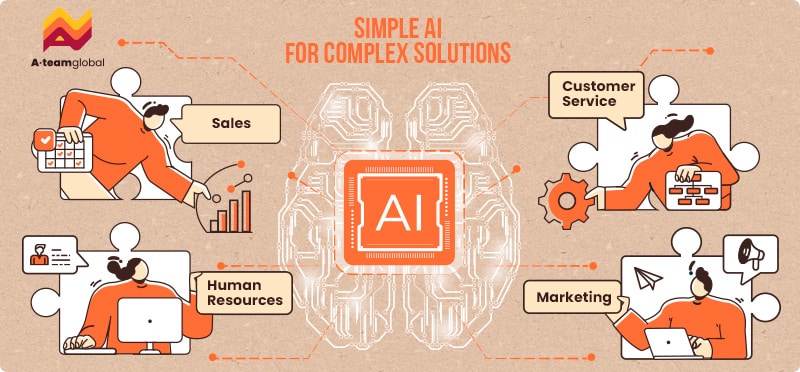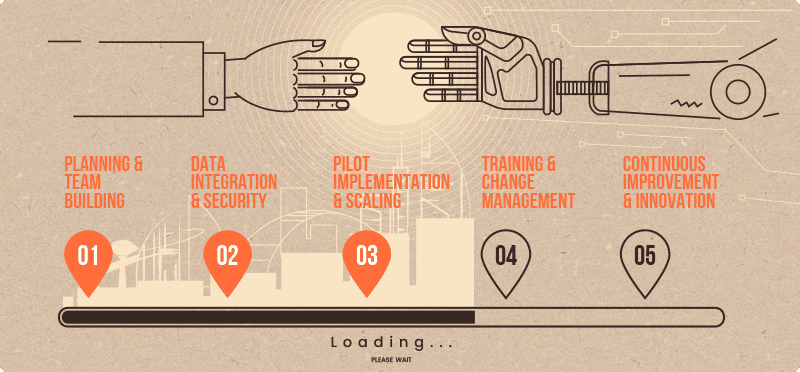Crafting Brilliance: Elevate Your Craft with Essential React.js Skills

Join us as we unravel the key elements that transform a React.js enthusiast into a seasoned craftsman. From mastering component composition and state management to optimizing performance and embracing the latest advancements, this article serves as your compass in the dynamic landscape of web development.
Are you ready to embark on a quest to forge a deeper understanding of React.js, and emerge as a brilliant craftsman in the ever-evolving world of front-end development? Let's embark on this journey together and unlock the door to crafting brilliance with essential skills for React.js developers.
Introduction
In the dynamic realm of web development, React.js has emerged as a pivotal technology, revolutionizing the way interactive user interfaces are created. According to Statista, 40.6 percent of developers worldwide use React.js as of 2023, making it still one of the most popular and widely used frameworks. To thrive in this ever-evolving landscape, React.js developers must possess a diverse skill set that goes beyond mere coding proficiency. These professionals are expected to demonstrate a deep understanding of JavaScript, as React.js is built upon this foundational language. Additionally, expertise in state management, component-based architecture, and virtual DOM manipulation is crucial for crafting efficient and scalable applications. Proficiency in using React Router for navigation and integrating third-party libraries further enhances a developer's toolkit.
Moreover, a keen eye for responsive design and the ability to collaborate seamlessly with designers and backend developers are essential attributes. Given the importance of modern development workflows, React.js developers are often required to be well-versed in tools such as Webpack and Babel. It’s also important to make proper React developer skills assessment when hiring a React developer professional. Finally, staying abreast of the latest industry trends, attending conferences, and actively participating in the open-source community contribute to the holistic skill set that defines a successful React.js developer in today's competitive landscape.
Our React development services simplify any software development task, whether you're creating fully functional web portals from scratch or updating older websites to newer versions.

React.js developers hard skills
React.js developers are expected to possess a comprehensive set of hard skills to effectively build dynamic and responsive user interfaces. Here are some key hard skills that are essential for React.js developers:
Proficient in JavaScript
A strong foundation in JavaScript is fundamental, as React.js is a JavaScript library. Understanding concepts such as closures, callbacks, and promises is crucial for effective React development.
React.js and JSX
In-depth knowledge of React.js and JSX (JavaScript XML) is essential. JSX is a syntax extension for JavaScript used with React to describe what the UI should look like.
Component-Based Architecture
React.js follows a component-based architecture. Developers should be adept at creating, managing, and reusing components to build modular and scalable applications.
State Management
React.js applications often involve complex state management. Developers should be skilled in handling state efficiently, using features like hooks (e.g., useState, useEffect) and managing state with context.
Virtual DOM
Understanding and leveraging the virtual DOM is crucial for optimizing performance in React applications. Developers should know how to make efficient updates to the DOM through the virtual DOM.
Routing with React Router
For building single-page applications, knowledge of React Router is essential. React Router enables navigation and URL routing in React applications.
RESTful APIs and AJAX
React.js applications frequently interact with APIs to fetch and send data. Developers should be familiar with making asynchronous requests using tools like the Fetch API or libraries like Axios.
Responsive Design and CSS Preprocessors
Skills in responsive design and styling with CSS are important. Knowledge of CSS preprocessors like Sass or Less can enhance the developer's styling capabilities.
State Management Libraries
For complex state management, developers should be proficient in using state management libraries like Redux. Understanding actions, reducers, and middleware is crucial.
Version Control/Git
Proficiency in version control systems, especially Git, is necessary for collaborative development and tracking changes in the codebase.
Development Tools
Familiarity with browser developer tools and other development tools (such as React DevTools) is important for debugging and optimizing code.
Build Tools
React.js projects often use build tools like Webpack and Babel. Developers should be skilled in configuring and optimizing these tools for the project's needs.
These hard skills, when combined, enable React.js developers to build robust, scalable, and efficient web applications. Keep in mind that staying updated with the latest advancements in React.js and the broader web development ecosystem is an ongoing part of a React.js developer's skill development.
React.js developers soft skills

Soft skills are essential for React.js developers, as they contribute to effective collaboration, communication, and overall success in a team environment. Here are some important soft skills for React.js developers:
- Communication Skills
- Clear Articulation: Expressing technical concepts in a clear and understandable manner.
- Active Listening: Understanding requirements and feedback from team members and stakeholders.
- Teamwork
- Collaboration: Working effectively with other developers, designers, and stakeholders.
- Adaptability: Being open to feedback and able to adjust to changes in project requirements.
- Problem-Solving
- Critical Thinking: Analyzing issues and devising effective solutions.
- Debugging Skills: Proficient in identifying and fixing bugs in code.
- Time Management
- Prioritization: Managing multiple tasks and deadlines efficiently.
- Time Estimation: Accurately estimating the time required for tasks and projects.
- Attention to Detail
- Code Quality: Writing clean and maintainable code.
- Testing: Thoroughly testing code to ensure it meets specifications and is free of bugs.
- Effective Documentation
- Code Documentation: Writing clear and concise comments in code.
- Project Documentation: Documenting project architecture, APIs, and other relevant information.
- Conflict Resolution
- Diplomacy: Handling disagreements and conflicts in a constructive manner.
- Compromise: Finding solutions that are acceptable to all parties involved.
- Leadership Skills
- Taking Initiative: Proactively contributing ideas and solutions.
- Mentoring: Helping junior developers and sharing knowledge with the team.
Soft skills are as crucial as technical skills in a professional setting. React.js developers who excel in both areas are better equipped to contribute to the success of their projects and teams.
React js developer skills assessment and hiring process
The hiring process for a React.js developer typically involves assessing a candidate's skills, experience, and cultural fit for the team. Here's a general outline of the process:
- Job Posting and Recruitment
- Clearly define the role, responsibilities, and requirements for the React.js developer position.
- Post the job on relevant job boards, company website, and social media platforms.
- Actively source candidates through professional networks and referrals.
- Resume Screening
- Review resumes to ensure candidates have the necessary skills and experience.
- Look for previous experience with React.js, JavaScript, HTML, CSS, and any relevant frameworks or libraries.
- Initial Contact and Phone Screen
- Conduct a brief phone interview to assess the candidate's communication skills and general fit for the role.
- Discuss their experience, projects they've worked on, and their familiarity with React.js.
- Technical Assessment
- Depending on the level of the role, provide a technical assessment to evaluate the candidate's React.js skills. This could be a coding challenge, a take-home project, or a pair-programming session.
- Assess their ability to write clean and efficient code, their understanding of React.js concepts, and their problem-solving skills.
- Technical Interview
- Conduct one or more technical interviews where the candidate can demonstrate their React.js knowledge in real-time.
- Cover topics such as state management, component lifecycle, JSX, routing, and any other relevant concepts.
- Ask about their experience with related technologies like Redux, GraphQL, or testing frameworks.
- Coding Interview
- Conduct a live coding interview to evaluate the candidate's problem-solving skills and ability to write code under pressure.
- Focus on React.js-specific scenarios and challenges.
- Portfolio and Project Review
- Review the candidate's portfolio and any projects they've worked on.
- Assess the complexity of the projects, the technologies used, and the impact of their contributions.
- Reference Checks
- Contact the candidate's references to verify their work history, skills, and overall performance.
- Offer and Negotiation
- Extend a job offer to the selected candidate, outlining the terms and conditions of employment.
- Negotiate salary, benefits, and any other relevant details.
- Onboarding
- Once the candidate accepts the offer, facilitate the onboarding process and provide necessary training and resources.
Keep in mind that this process may vary depending on the company's size, industry, and specific requirements. Adjustments can be made based on the seniority of the role and the unique needs of your organization.
Check out our article on React.js Interview Questions.
How to hire a good React.js developer (freelancers vs outstaffing companies)
Hiring a good React.js developer is crucial for the success of your project. When deciding between freelancers and outstaffing companies, consider the following factors to make an informed decision.
Hiring a Freelancer
Let’s look at the pros and cons of hiring a freelance React developer.
Pros:
- Cost-Effective:
- Freelancers often have lower hourly rates compared to agencies.
2. Flexibility:
- Freelancers can be more flexible with their working hours and may adapt to your project schedule.
3. Diverse Skillsets:
- You can find freelancers with various skill sets and experiences.
4. Direct Communication:
- Direct communication with the developer allows for quick feedback and changes.
Cons:
- Limited Resources:
- Freelancers might have limited resources compared to a company.
2. Dependency on a Single Individual:
- If the freelancer becomes unavailable or leaves the project, it can lead to delays.
3. Quality Assurance:
- Ensuring code quality may require additional effort and resources.
Hiring an Outstaffing Company
Here are some advantages and disadvantages of hiring an outstaffing company.
Pros:
- Team Collaboration
- Outstaffing companies often provide access to a team of skilled professionals with diverse expertise.
- Resource Scalability
- Easily scale your team up or down based on project requirements.
- Professionalism
- Established outstaffing companies may have standardized development processes and practices.
- Project Management
- Outstaffing companies often provide project management services, ensuring timely delivery.
Cons:
- Higher Cost:
- Outstaffing companies may charge higher rates compared to freelancers.
2. Less Flexibility:
- The development process may be less flexible compared to working with a single freelancer.
General Tips
Here we’ve prepared general tips for you to determine whether it’s better for you to hire a freelancer or an outstaffing company.
- Define Your Project Needs
- Clearly define your project requirements, timeline, and budget before starting the hiring process.
- Evaluate Portfolios and Resumes
- Review the portfolios and resumes of potential candidates or teams to assess their skill levels and experience.
- Check References
- Ask for and check references to ensure the developer or team has a good track record.
- Communication Skills:
- Good communication skills are crucial. Ensure that the developer or team can effectively communicate with you and understand your requirements.
- Technical Skills Assessment
- Conduct technical interviews or assessments to evaluate the candidate's proficiency in React.js and related technologies.
- Trial Period
- Consider starting with a small project or trial period to assess the developer's performance before committing to a long-term engagement.
Ultimately, the choice between freelancers and outstaffing companies depends on your project requirements, budget, and preferences. Be thorough in your evaluation process to ensure you hire a skilled and reliable React.js developer or team.
You might also check out our article on why React.js is so popular these days.
Conclusion
In conclusion, hiring a React.js developer requires a careful consideration of essential skills to ensure the success of your projects. A proficient React.js developer should possess a strong foundation in core JavaScript and demonstrate expertise in React.js, including state management, component lifecycle, and JSX. Familiarity with popular state management libraries, such as Redux, and the ability to optimize application performance are crucial aspects of a skilled React.js developer. Additionally, a developer's proficiency in integrating APIs, handling asynchronous operations, and understanding modern frontend build tools contributes significantly to their effectiveness. In a rapidly evolving ecosystem, staying updated with the latest React.js features and industry best practices is essential for a developer to deliver high-quality and maintainable code.
you may also want to read

Leveraging Local LLMs and Secure Environments to Protect Sensitive Information
In the rapidly evolving digital landscape, businesses are increasingly adopting Generative AI (GenAI) technologies to stay competitive and innovate. Large...

Boost Efficiency Today: Easy AI Integration for Immediate Results
In the past, the idea of integrating artificial intelligence into your business might have felt like venturing into uncharted territory—complex,...

A Roadmap to Gen AI Adoption for Small and Medium Businesses
Unlock new opportunities by integrating Generative AI into your business operations. In today’s fast-paced digital landscape, small and medium businesses...
